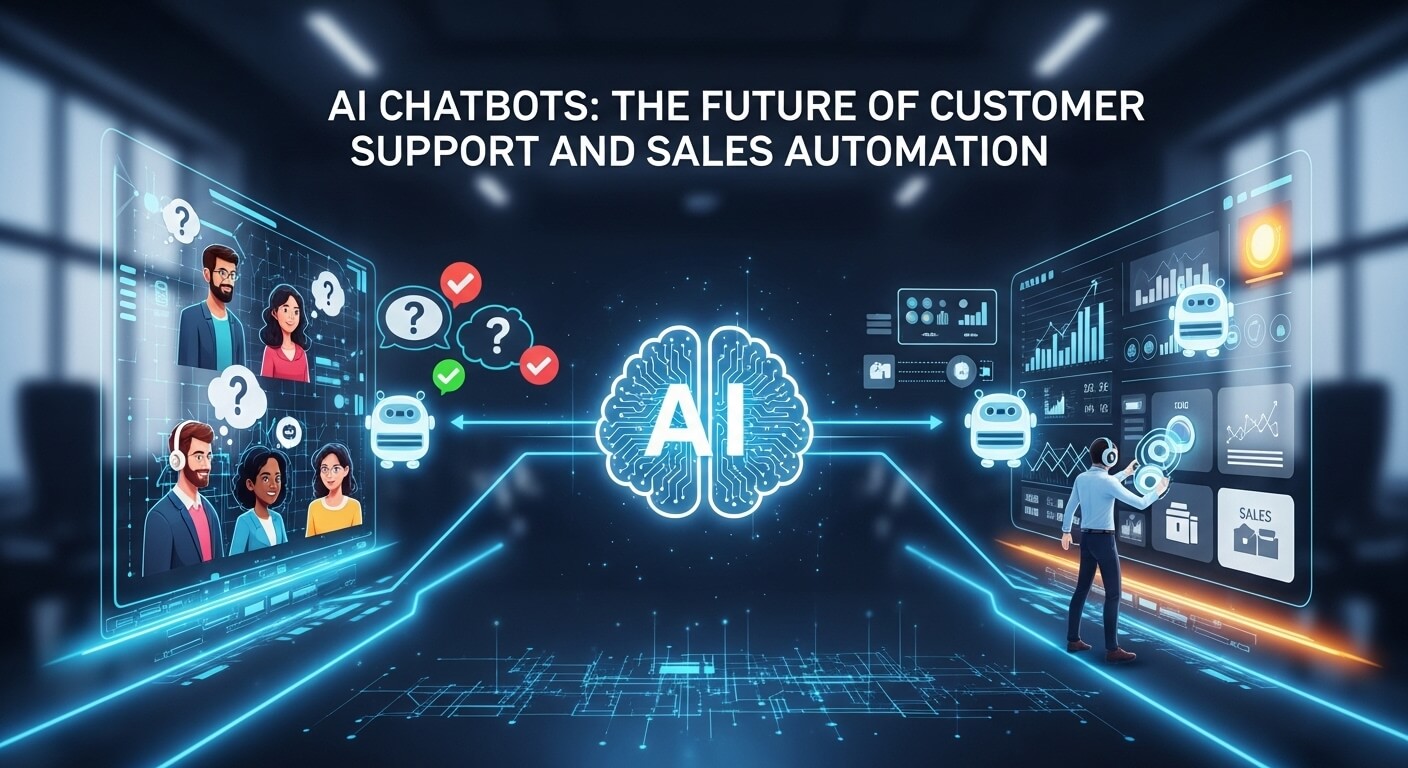Introduction
AI chatbots are no longer just a buzzword—they are transforming how businesses deliver customer support and automate sales. By using artificial intelligence, natural language processing (NLP), and machine learning (ML), modern chatbots provide 24/7 assistance, resolve customer queries, generate leads, and guide users through purchase decisions.
A few years ago, most chatbots were limited to scripted replies. Today, intelligent chatbots can understand context, sentiment, and intent, making conversations feel human-like. Businesses that embrace chatbot technology are gaining a competitive edge by reducing costs, improving customer satisfaction, and scaling operations seamlessly.
This article explores the future of AI chatbots in customer support and sales automation, their benefits, limitations, and how businesses can implement them for long-term success.
What Are AI Chatbots?
AI chatbots are conversational programs designed to simulate human-like interactions with users via text, voice, or even video. Unlike rule-based bots that follow strict scripts, AI chatbots use NLP to understand meaning, analyze intent, and provide relevant responses.
- Rule-based Chatbots→ Predefined responses, limited flexibility.
- AI-powered Chatbots→ Adaptive, self-learning, and capable of handling complex queries.
For example:
- Banking:Assisting with account balances, transactions, and fraud detection.
- Healthcare:Scheduling appointments and offering preliminary medical advice.
- E-commerce:Guiding customers from browsing to checkout.
- SaaS Companies:Providing onboarding assistance and troubleshooting.
According to Gartner, by 2027, chatbots will handle 25% of all customer service interactions.
Why Businesses Are Turning to AI Chatbots
AI chatbots fill this gap by:
- Offering round-the-clock support.
- Managing thousands of queries at once.
- Reducing response times from minutes to seconds.
- Allowing businesses to scale without hiring large teams.
Research shows that 69% of consumers prefer chatbots for quick communication with brands.
The Role of AI in Customer Support
Customer support has traditionally been resource-heavy—requiring large teams, training programs, and constant supervision. AI chatbots change the game by:
- Reducing wait times:Instant replies build trust and satisfaction.
- Handling FAQs:Chatbots resolve repetitive queries, freeing humans for complex issues.
- Offering multilingual support:Global businesses can serve customers in multiple languages.
- Seamless escalation:When chatbots can’t resolve an issue, they transfer to human agents with full context.
💡 Example: A telecom provider reduced support costs by 30% after implementing AI chatbots that resolved 70% of customer queries without human intervention.
AI Chatbots in Sales Automation
While most people associate chatbots with support, their real power lies in sales automation. Here’s how:
- Lead Qualification:AI chatbots ask pre-set questions to identify high-quality leads.
- Personalized Recommendations:They analyze browsing history or customer behavior to suggest relevant products.
- Guided Checkout:Chatbots can guide users through payments, increasing completed sales.
- Upselling & Cross-selling:Intelligent prompts encourage customers to add complementary products.
- Cart Recovery:Bots send reminders and discounts to recover abandoned carts.
💡 Case Study: An e-commerce store integrated an AI chatbot on its website and achieved a 20% increase in sales conversions within three months.
Benefits of AI Chatbots for Businesses
- Cost Efficiency
- Reduce the need for large customer service teams.
- Lower training and HR costs.
- Save resources by automating repetitive tasks.
- Scalability
- Handle thousands of conversations simultaneously.
- Support peak traffic periods without extra staffing.
- Customer Satisfaction
- Faster issue resolution.
- Personalized responses increase brand loyalty.
- 24/7 support builds trust.
- Data Insights
- Chatbots collect and analyze customer queries.
- Businesses gain insights into preferences, FAQs, and buying triggers.
- Revenue Growth
- Streamlined sales funnels.
- Increased conversions through proactive engagement.
- Effective upselling and cross-selling.
AI Chatbots vs. Traditional Customer Support
Feature
Traditional Support
AI Chatbots
Availability
Limited to business hours
24/7, global reach
Response Time
Minutes to hours
Instant responses
Costs
High staffing costs
Lower long-term investment
Scalability
Limited by workforce
Unlimited, handles thousands at once
Personalization
Agent-dependent
AI-driven, data-backed
Consistency
May vary per agent
Standardized and reliable
Both models have value, but AI chatbots enhance efficiency while humans handle empathy-driven, complex interactions.
Challenges and Limitations of AI Chatbots
Even the best AI chatbots face challenges:
- Complex Queries:Bots may fail when faced with nuanced issues.
- Robotic Feel:Poorly designed bots frustrate customers.
- Language Barriers:Misinterpretations still occur with slang or sarcasm.
- Privacy Concerns:Businesses must comply with GDPR, HIPAA, or CCPA
- Training Requirements:Continuous updates and machine learning input are necessary.
The Hybrid Model: AI Chatbots + Human Agents
The most effective approach is hybrid support, where chatbots handle routine tasks while humans step in for advanced needs.
Benefits of hybrid support:
- Ensures smooth handoffs.
- Reduces customer frustration.
- Allows agents to focus on high-value tasks.
- Balances efficiency with empathy.
💡 Example: A travel company used chatbots for bookings and humans for complaint resolution, resulting in 40% higher customer satisfaction.
Future Trends of AI Chatbots
The most effective approach is hybrid support, where chatbots handle routine tasks while humans step in for advanced needs.
Benefits of hybrid support:
- Ensures smooth handoffs.
- Reduces customer frustration.
- Allows agents to focus on high-value tasks.
- Balances efficiency with empathy.
💡 Example: A travel company used chatbots for bookings and humans for complaint resolution, resulting in 40% higher customer satisfaction.
How to Implement AI Chatbots in Your Business
- Define Goals→ Customer support, lead generation, or sales automation.
- Choose the Right Platform→ Custom development or SaaS-based chatbot builders.
- Train Your Bot→ Use FAQs, customer data, and industry knowledge.
- Test & Optimize→ Run pilot programs to identify gaps.
- Integrate with CRM & Analytics→ Ensure smooth data flow.
- Monitor Performance→ Continuously update to improve efficiency.
Choosing the Right AI Chatbot Development Partner
Many businesses fail because they pick generic chatbot solutions. To succeed:
- Select a partner with AI + NLP expertise.
- Ensure bots integrate with existing tools (CRM, CMS, ERP).
- Focus on customizationfor your industry.
- Demand transparency on data security and compliance.
Pro Tip: A professional chatbot development company can build a scalable solution tailored to your goals.
Case Studies: AI Chatbots in Action
- Banking
- A leading bank introduced chatbots for balance inquiries and saw a 50% reduction in call center workload.
- Retail
- An online store’s chatbot increased average order value by 15%through cross-selling strategies.
- Healthcare
- A hospital implemented chatbots for appointment scheduling, reducing patient wait times by 40%.


